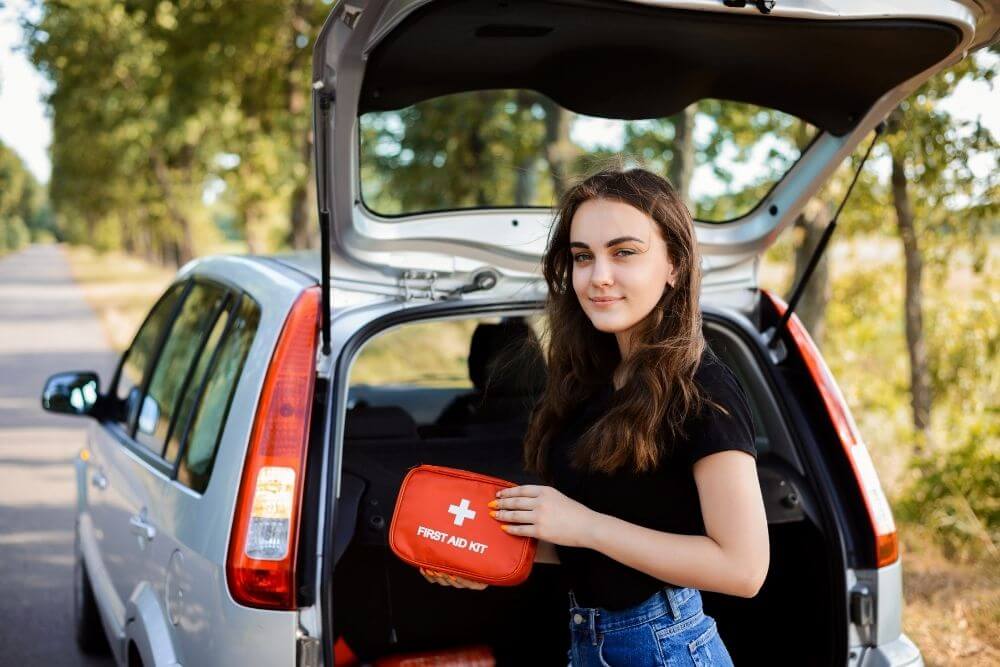How to Build a Road Trip First Aid Kit
If you’re headed out on the open road, make sure you are ready for anything. After all, you probably already have a spare tire in your vehicle. So why wouldn’t you pack a simple road trip first aid kit? Wound care, basic illness treatment, and emergency supplies could save an otherwise great trip from being ruined. It can also save lives. In this article, we’ll explore the basic must-haves for every road trip, from weekend cruises to cross-country adventures.
Guide to Preparing Your First Aid Kit
First off, your road trip first aid kit does not need to be overly complicated. Don’t think of it as packing the entire medicine cabinet in your trunk. Rather, think of it as basic emergency preparedness. You might regularly pack water bottles, blankets, and extra snacks for a road trip. Likewise, make a habit of regularly checking to make sure that you are prepared for wound care, travel sickness, and other mishaps that can occur while on the go.
Select a medium to small sealable bag, tote, or box - even a simple freezer-size ziplock bag will do in a pinch. A clear travel-size toiletries bag is another good option. Then, identify a devoted storage spot in your vehicle. You’ll want your first aid kit to be easily accessible and, ideally, stored in the same spot for quick access. For some that may be the glove compartment or center console, for others, stored behind a front seat, or even in the trunk. Consistency is key to staying calm under pressure during a medical situation.
Wound Care Essential Checklist
Every road trip first aid kit needs the basics. From bumps to bruises, cuts to scratches burns to bug bites, here are the wound care essentials you need on the road:
- Hand sanitizer and antibacterial wipes for cleaning up hands and tools
- Tweezers for removing splinters, shards, stingers, and ticks
- Self-adhesive wrap for securing twisted ankles, bumped knees, and other minor injuries
- Antiseptic wipes or spray for cleaning up wound sites
- Antibiotic ointments for protecting scratches and cuts from infection
- Bandage alternative wound closure devices like microMend
- Gauze pads or rolls for larger wound sites, or for securing microMend from prying fingers
- Medical tape or safety pins for closing larger dressings
- Scissors for trimming medical tape and gauze or crepe bandage
- Aloe vera, calamine lotion, cortisone, and other burn and itch relief topical treatments
- Instant cold packs for easing bumps and bruises
All of the above can be packed tightly and take up little room, particularly as wraps, rolls, and microMend wound care devices can all be customized to the size of the wound. Purchasing smaller, travel-size packaging for ointments and other topical treatments can also help with traveling. As an alternative, consider keeping larger stock in your home, and simply replenishing your road trip first aid kit supplies before each trip.
Travel Illness Treatment Checklist
In addition to wound care, illness can occur while on the road, too. From motion sickness to headaches, to the sudden onset of a cold or flu, being prepared will help minimize any major discomfort and keep your road trip on track. Here are the basic treatments everyone should have in their first aid kit:
- Thermometer for monitoring any fevers
- Motion sickness medicine (carry both traditional and less-drowsy formulas)
- Antacid, anti-diarrheal, and laxatives for digestive issues
- Cold relief medicine (both daytime and nighttime formulas)
- Cough drops for dry throats
- Antihistamines for allergy treatment
- Aspirin, ibuprofen, or other pain relief medicine
- Any personal medications, including epinephrine pens, insulin, inhalers, or spare glasses
Depending upon where you are in our great country, a side trip to the nearest pharmacy or urgent care can be time-consuming and costly. That’s why keeping the basics of wound care and illness treatment in your road-tripping vehicle at all times more than pays for itself.
Be Road Trip Ready
Once you have your complete road trip first aid kit all gathered up and stashed in your vehicle, you’re nearly ready to go. That being said, it is important to check on the status of your kit before embarking on any road trip. Why? Many medications and medical devices come with expiration dates and may be compromised if exposed to extreme weather conditions such as freezing or heat.
Even if you take infrequent road trips, making a habit of periodically inventorying your first aid kit along with any spare tires, blankets, or other emergency equipment you keep in your vehicle is a wise decision.
Finally, ensure that at least one person on your road trip fully understands how to administer and use all the first aid items in your emergency kit. Get to know the instructions for each first aid kit essential, and review videos or helpful medical sites on how to treat some of the more common wound care and illness needs. Basic preparedness will go miles ahead in ensuring that every road trip becomes a happy memory for you and your family.


